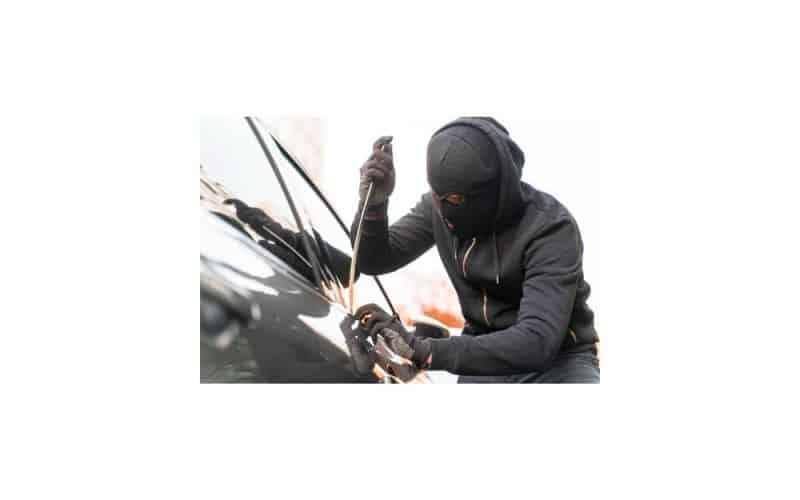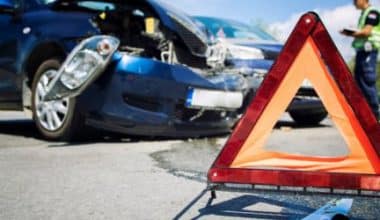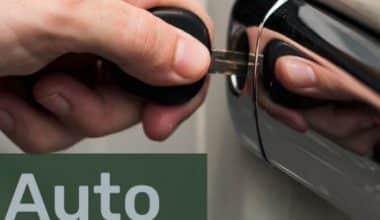If you have comprehensive car insurance as part of your policy, it will likely cover the theft. You’ll need to check your policy’s terms and conditions to fully understand what’s covered and how much you could receive. But if you don’t have comprehensive coverage, you might be out of luck.
Also remember that even if your car insurance covers the theft of the vehicle, it typically won’t cover any personal property that was in the car. Comprehensive car insurance only pays you if your car gets stolen. This optional coverage is the only way that car insurance reimburses you for theft.
That’s why it’s smart to buy comprehensive coverage.
Does car insurance cover car theft?
If you want insurance for car theft, you’ll need to add comprehensive insurance to your car insurance policy. Comprehensive coverage pays out for car theft and certain types of vehicle damage, up to the actual cash value of your car, minus your deductible.
Car insurance comes in a few different varieties. Liability is the most basic kind of auto insurance and covers bodily injury and property damage. It’s mandatory in all states except New Hampshire. Collision insurance is an optional coverage that helps pay for damage to your vehicle in case of an accident with another car or an object like a telephone pole. Neither liability nor collision coverage protects against vehicle theft.
If you’re looking for insurance that covers stolen vehicles, or damage to your vehicle from a break-in, you need a comprehensive policy. Comprehensive insurance also covers damage from storms, falling objects, or animals.
What comprehensive car insurance covers
Comprehensive car insurance will cover these theft-related problems:
- It pays if your car is stolen.
- It pays to replace car parts that are stolen, such as a catalytic converter, but not custom parts or equipment, like an aftermarket sound system.
- Pays to repair damages caused by theft, car break-in or attempted break-in.
- It pays if your stolen car is recovered and needs to be repaired.
You will be responsible for your deductible for a theft claim. For example, if you have a $500 deductible and your car is valued at $7,000, you would get an insurance check for $6,500 ($7,000 – $500 deductible = $6,500).
Comprehensive insurance also covers damage to your vehicle from problems such as vandalism, fires, floods, hail, falling objects (like tree branches) and collisions with animals (like deer).
No state law mandates that you have comprehensive insurance. But if you finance or lease your vehicle, your lender will likely require you to buy comprehensive coverage in order to protect their financial interest.
Comprehensive insurance won’t cover personal items that are stolen from your vehicle. For example, if your laptop gets stolen, comprehensive coverage won’t pay to replace it. However, you generally have coverage for stolen items under condos, renters, or homeowners insurance.
Another thing comprehensive insurance won’t cover is the cost of a rental car. If your vehicle is stolen or damaged, you’ll need rental reimbursement insurance if you want to make an insurance claim for a rental car while your vehicle issue is resolved.
Other types of insurance may help
Though comprehensive generally covers vehicle theft and damage from break-ins, it covers only the car itself. If you had personal property stolen from inside the car, like a laptop or sports equipment, your car insurance won’t cover it.
However, most homeowners or renters policies cover theft of your personal property, even items stolen from your car. Check the exact terms and conditions of your policy so that you know what is and isn’t covered. Then, you’ll file two different insurance claims, one to your car insurance for the car itself, and another to your homeowners or renters insurance for the personal property that was inside the car.
How much does comprehensive car insurance cost?
The average cost of comprehensive insurance is $298 per year, based on Forbes Advisor’s analysis.
| State | Average cost of comprehensive insurance |
|---|---|
| Alabama | $269 |
| Alaska | $193 |
| Arizona | $230 |
| Arkansas | $352 |
| California | $178 |
| Colorado | $498 |
| Connecticut | $159 |
| Delaware | $185 |
| Florida | $275 |
| Georgia | $266 |
| Hawaii | $104 |
| Idaho | $169 |
| Illinois | $289 |
| Indiana | $259 |
| Iowa | $403 |
| Kansas | $533 |
| Kentucky | $397 |
| Louisiana | $378 |
| Maine | $150 |
| Maryland | $191 |
| Massachusetts | $237 |
| Michigan | $393 |
| Minnesota | $432 |
| Mississippi | $325 |
| Missouri | $426 |
| Montana | $420 |
| Nebraska | $556 |
| Nevada | $175 |
| New Hampshire | $140 |
| New Jersey | $210 |
| New Mexico | $269 |
| New York | $415 |
| North Carolina | $143 |
| North Dakota | $494 |
| Ohio | $233 |
| Oklahoma | $485 |
| Oregon | $171 |
| Pennsylvania | $318 |
| Rhode Island | $169 |
| South Carolina | $290 |
| South Dakota | $692 |
| Tennessee | $275 |
| Texas | $348 |
| Utah | $212 |
| Vermont | $200 |
| Virginia | $211 |
| Washington | $149 |
| West Virginia | $344 |
| Wisconsin | $359 |
| Wyoming | $349 |
Recovered cars and comprehensive car Insurance
Sometimes stolen cars are found after you file a comprehensive insurance claim. What happens if you already got paid by your insurance company for your stolen vehicle and then it’s recovered? The car insurance company takes ownership of the stolen car if it’s found after you’ve been paid for your comprehensive insurance claim.
Suppose you filed a comprehensive claim but have not yet been paid, and your stolen car is recovered but it’s damaged. Your comprehensive insurance will pay for repairs, up to the actual cash value of your car, minus your deductible.
In some cases, your car might be totaled because of the cost of repairs. If the claim hasn’t been paid and your recovered car is totaled, your insurer would pay the same as it would if the car wasn’t found after the theft—your deductible is applied and it pays you the actual cash value of the vehicle.
What to do if your car is stolen or broken into
If your vehicle is stolen, call the police and file a report immediately. The police will want basic information such as the make and model, plate number, and maybe the vehicle identification number. Then contact your insurance company to see if you’re covered. Call your homeowners or renters insurance carrier if you think personal items were left inside the car.
If you return to your vehicle and see that it was broken into, perhaps with broken door locks or smashed windows, the process is similar. First, call the police and report the break-in. Then, take photos or videos to document the damage, and call your car insurance company. If items are missing from inside the car, also call your homeowners or renters insurance company.
How much will I get if my car is stolen?
If your claim is successful, many insurance carriers use the actual cash value (ACV) of your vehicle to determine your payout. The total will also depend on the terms of your policy. An adjuster from the insurance company determines the vehicle’s value based on its age, make, model, and normal wear and tear.
When the adjuster has come up with a value for the car, you’ll usually receive a check for that amount minus any deductible that you have on your policy.1
Does car theft insurance cover stolen items?
No.
Comprehensive car insurance covers theft of the vehicle and damage due to a break-in, such as smashed windows or a broken ignition. But car insurance doesn’t cover your personal items stolen from inside your car or items that were in the vehicle when it was taken. If you have homeowners or renters insurance, these policies should cover your personal items.
How can I prevent my car from being stolen?
There are several things you can do to reduce the risk of your car being stolen. The NICB recommends a layered approach.
Take simple security steps
The first layer of defense is common sense. Don’t make car theft easy for the thief. A few simple precautions can reduce the likelihood of someone taking off with your car.
- Lock your doors.
- Take your keys out of the ignition.
- Close your windows.
- Park your car in well-lit areas.
Use a visible or audible anti-theft device
The second layer involves adding some sort of anti-theft device to help deter a car thief, including:
- Audible car alarms.
- Brake locks.
- Identification markers in or on the car, such as security labels that mark various parts that can be identified if they are removed.
- Microdot marking.
- Steering column collars.
- Steering wheel/brake pedal lock.
- Wheel locks.
- Window etching.
Install a vehicle immobilizer
The third layer involves installing a device that will prevent a car thief from driving off with your car, including:
- Kill switches.
- Fuse cut-offs.
- Smart keys.
- Starter, ignition and fuel disablers.
- Wireless, ignition authentication.
Get a tracking system
The fourth and final layer involves installing a tracking system that police or a monitoring service can use to locate your vehicle if it is stolen. Some of these devices use GPS and wireless technologies. For example, the LoJack Stolen Vehicle Recovery System uses a hidden transceiver that can be tracked by police and aircraft.
Here are some other ways to prevent car theft:
- Always turn off your vehicle if you’re not in it and take the keys with you. Even in your own driveway.
- Lock all doors, windows and the trunk or hatch every time you leave your vehicle.
- Choose parking spaces that are off-street, highly visible, and well-lit, whenever possible. Don’t leave your vehicle in an unmonitored parking lot or parking garage for long periods of time.
- Never write your name or address on your keychain. If it’s lost, thieves can use this information to locate and steal your vehicle.
- Park your vehicle with the front end facing an obstacle, such as a wall or guardrail. This makes it harder for thieves to tow or roll your car away if they can’t get it started.
- When you must park on the street, turn the wheels toward the curb and lock the steering wheel. Again, this makes it harder to tow your car away without damage.
- Have your VIN number chemically etched on your windows by a car dealership or local police department, if it’s not there already. Etching makes it harder for thieves to resell your vehicle and its parts.
How do insurance companies investigate car theft claims?
When you file an insurance claim for a car theft, your insurance company will most likely investigate the theft. You’ll need a police report to make a theft claim.
Your claim could be assigned to your insurance company’s special investigations unit. A typical investigation might include obtaining the police report, speaking with witnesses, investigating the scene of the theft and a forensic analysis if the vehicle is recovered.
Additionally, a special investigations unit investigator could contact you and ask follow-up questions regarding the theft of your vehicle. You could also be required to attend an examination under oath, which is a formal proceeding where you are questioned by a representative of an insurance company in the presence of a court reporter and subject to perjury.
Your auto insurance policy requires you to cooperate with your insurance company’s investigation. If you fail to do so, your claim could be denied.
nt victims. PIP is also known as no-fault insurance because it covers accident-related expenses regardless of who’s at fault.
PIP is part of the no-fault insurance laws and is mandatory in Delaware, Florida, Hawaii, Kansas, Massachusetts, Michigan, Minnesota, New Jersey, New York, North Dakota, Oregon, and Utah. Some other states allow you to purchase optional PIP coverage.
Why do you need car insurance?
Car insurance covers unforeseen bills and liabilities arising from an accident. It protects you from hefty out-of-pocket expenses, provided you don’t exceed the coverage limit. Without it, you risk paying out-of-pocket to settle legal claims, medical expenses, and damages if you’re at fault. Here are some other reasons you need auto insurance:
Legal Requirements
Most states require basic liability coverage before you can legally register and drive a car. Driving without valid car insurance may lead to fines or even license suspension.
Car lease or financing
Banks, credit unions, and other lending institutions will require valid insurance to finance a car purchase. Likewise, car dealers will require you to purchase collision and comprehensive coverage before leasing a vehicle. Car insurance protects the company against financial losses if you file a claim after an accident.
Recommended Articles
- Liability vs Full Coverage Car Insurance 2023: Which Is Better?
- Elephant Car Insurance Review: Comprehensive Guide
- Car Insurance Calculator: How To Estimate Your Cost
- Can You Get Car Insurance Without a License? Explained!
- HOW DOES CAR INSURANCE WORK: The Complete Guide
- HOW TO SHOP FOR CAR INSURANCE: Easy Methods & Steps






